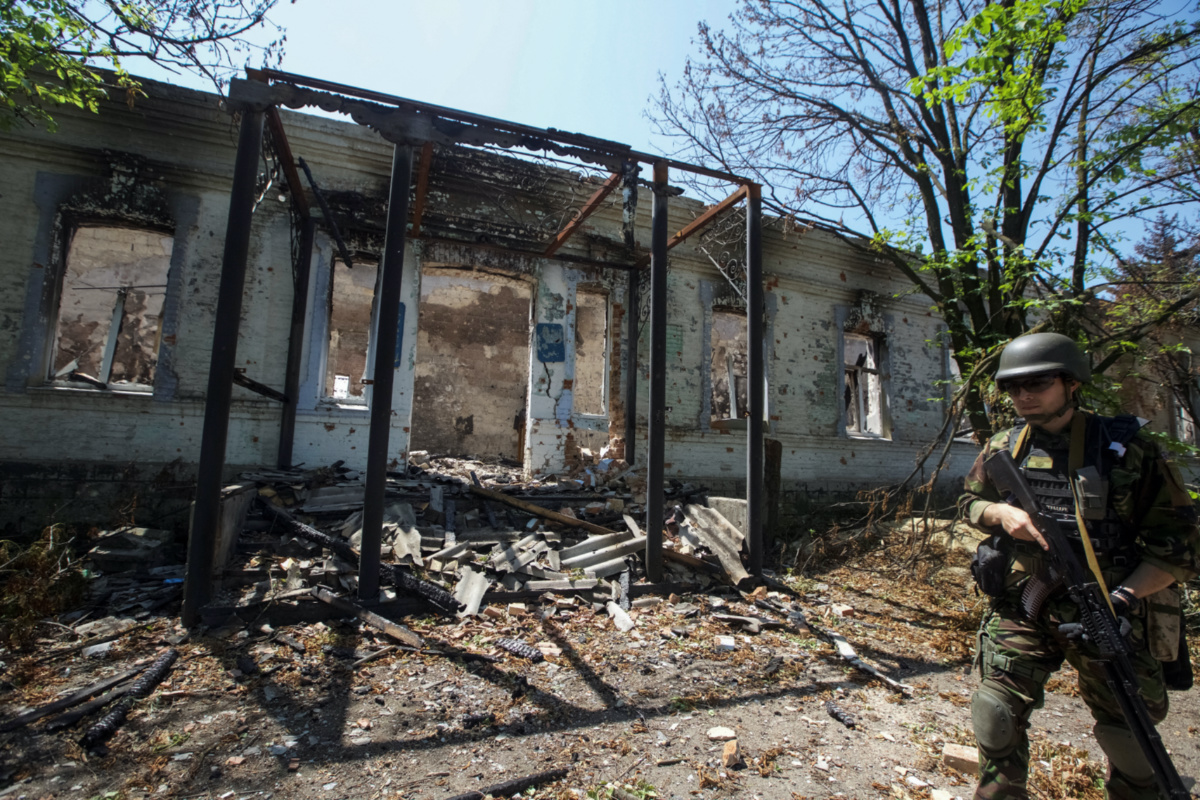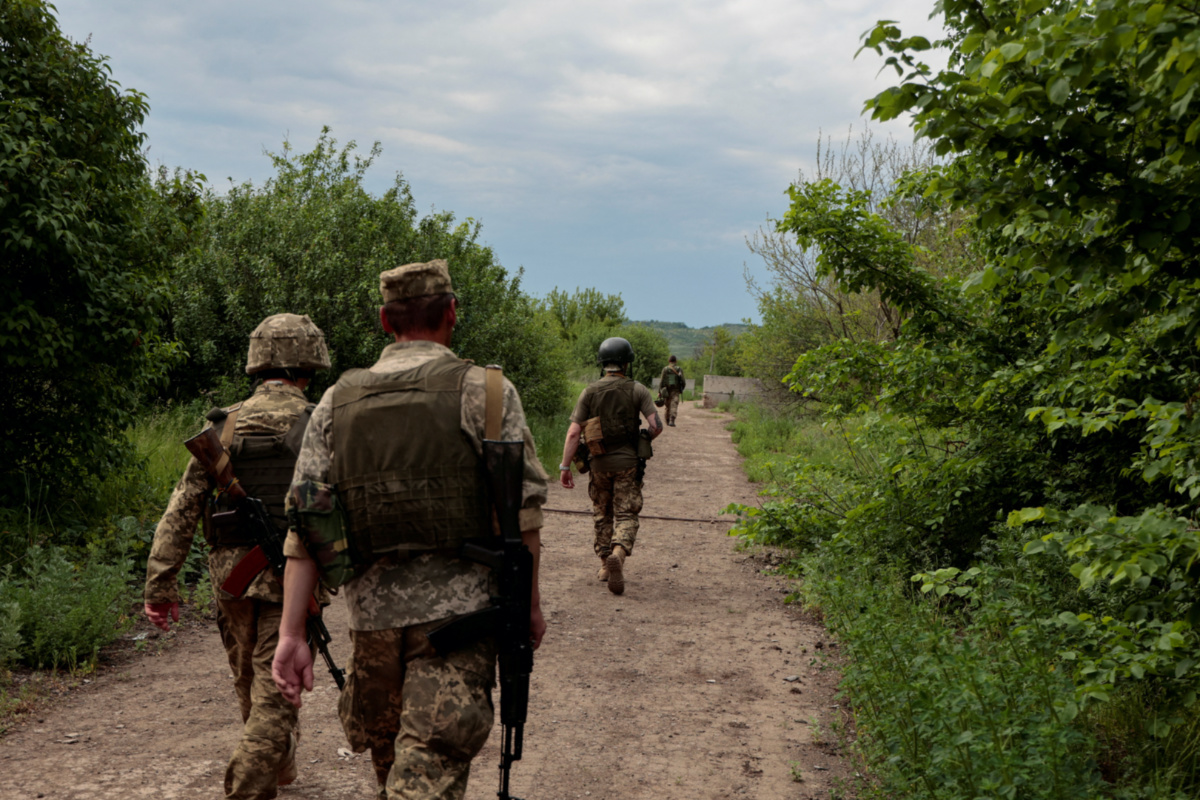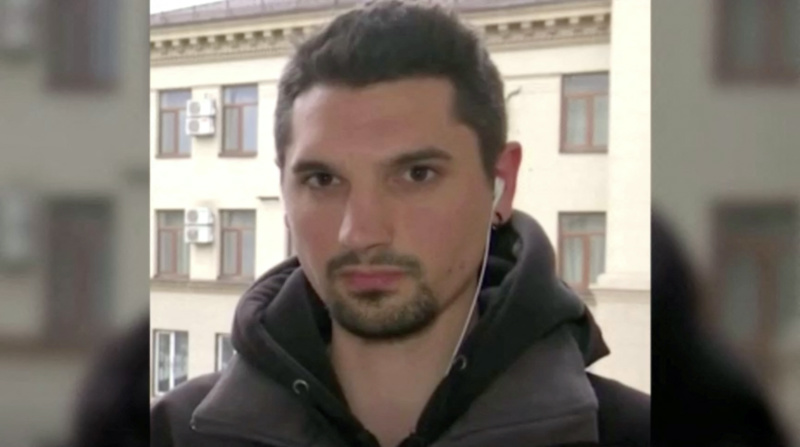Updated: 11am (AEST)
Kyiv/Lviv, Ukraine
Reuters
EU leaders agreed on Monday to ban most imports of Russian oil to the 27-nation bloc as Ukrainian and Russian forces battled on the outskirts of Sievierodonetsk, the last city still held by Kyiv in Ukraine’s strategic Luhansk province.
European Council President Charles Michel said on Twitter the ban, agreed at an EU summit in Brussels, would immediately cover more than two thirds of oil imports from Russia “cutting a huge source of financing for its war machine.”

A police officer checks an area during an evacuation of local residents between shelling, amid Russia’s attack on Ukraine, in the village of Novomykhailivka, in Donetsk region, Ukraine on 29th May. REUTERS/Anna Kudriavtseva
EU leaders meeting in Brussels also agreed to cut off the largest Russian bank, Sberbank, from the SWIFT system and to ban three more Russian state-owned broadcasters, Michel added.
The leaders said they had agreed to cut 90 per cent of oil imports from Russia by the end of this year, resolving an impasse over the bloc’s toughest sanction yet on Moscow since the invasion of Ukraine three months ago.
PARIS DEMANDS PROBE AFTER FRENCH JOURNALIST KILLED IN UKRAINE
France on Monday called for an investigation after a French journalist was killed in Ukraine when the vehicle he was travelling in, which was being used to evacuate civilians near the city of Sievierodonetsk, was hit by shelling.
“France demands that a probe be carried out as soon as possible and in transparency on the circumstances of this drama,” Foreign Minister Catherine Colonna, who was in Ukraine on Monday, said in a statement.
An undated photo of French journalist Frederic Leclerc-Imhoff, who was killed in shelling, is seen in this screengrab taken from a video released by BFM TV, obtained by Reuters on 30th May. PICTURE: BFM TV/via Reuters.
Frederic Leclerc-Imhoff, 32, the latest journalist killed since Russia invaded Ukraine in February, was on his second reporting trip for French television channel BFM in Ukraine, his employer said.
The Governor of Ukraine’s Luhansk region, Serhiy Haidai, said in a post on the messaging service Telegram that an armoured transport vehicle was hit by shrapnel from a Russian shell, killing the journalist. An attached picture showed a truck that appeared to have been adapted with armour.
The evacuation effort was suspended after the strike, he said.
Ukrainian President Volodymyr Zelenskiy said Leclerc-Imhoff was the 32nd media person killed since the start of the Russian invasion on 24th February.
“My sincere condolences to Frederic’s colleagues and family,” Zelenskiy said in his nightly video address.
Russia’s Foreign Ministry did not immediately respond to a request for comment. Moscow has repeatedly denied that its forces target civilians in Ukraine.
Colonna said on Twitter that she had spoken to the Luhansk governor and had asked Zelenskiy for an investigation.
Both had assured her of their help and support.
“It is a double crime to target a humanitarian convoy and a journalist,” she said.
President Emmanuel Macron said on Twitter: “Frederic Leclerc-Imhoff was in Ukraine to show the reality of the war. Onboard a humanitarian bus with civilians forced to flee to escape Russian bombs, he was mortally wounded.”
– DOMINIQUE VIDALON, CONOR HUMPHRIES and MAX HUNDER/Reuters
They agreed that the oil embargo would include exemptions for Hungary – a landlocked country that relies heavily on crude piped from Russia and which had been the main obstacle to a deal – and others concerned about the economic impact of the move.
Shortly before the announcement, Ukrainian President Volodymyr Zelenskiy said the situation remained “extremely difficult” in the Donbas region, where Russia has focus of its military effort after failing to capture Ukraine’s capital, Kyiv, in March.
Zelenskiy had called the EU too soft on Moscow when it appeared leaders would not reach an agreement on the oil ban.
Earlier, in Washington, President Joe Biden said the United States would not send Ukraine rocket systems that can reach into Russia, a decision Russian Security Council Deputy Chairman Dmitry Medvedev called “rational.”
Russia has been seeking to seize the entire Donbas region, consisting of Luhansk and Donetsk, another province Moscow claims on behalf of separatist proxies.
Capturing Sievierodonetsk and its twin city Lysychansk on the opposite bank of the Siverskyi Donets river would give Moscow effective control of Luhansk and allow the Kremlin to declare some form of victory after more than three months of death and destruction in Ukraine.
But by focusing on a battle for the single small city, Russia could leave other territory open to Ukrainian counterstrikes.
In his nightly address, Zelenskiy said the Donbas situation “remains extremely difficult” and said the Russian army was “trying to gather a superior force to put more and more pressure on our defenders.”
“The Russian army has now gathered there the maximum combat power,” he said of Donbas as a whole.
Kyiv said that in recent days, its forces pushed back Russian troops to defensive positions in Andriyivka, Lozove and Bilohorka, villages on the south bank of the Inhulets River that forms the border of Kherson province, where Moscow is trying to consolidate control.
Russian shelling
Zelenskiy said Russian forces shelled the city of Kharkiv again on Monday, as well as the border region of Sumy, which was hit from inside Russia.
Russian shelling has reduced much of Sievierodonetsk to ruins, but the Ukrainian defence has slowed the wider Russian campaign across the Donbas region.
Luhansk governor Serhiy Gaidai said Russian troops had advanced into Sievierodonetsk’s southeastern and northeastern fringes, but Ukrainian forces had driven them from the village of Toshkivka to the south, which could frustrate a push to encircle the area.
“They use the same tactics over and over again. They shell for several hours – for three, four, five hours – in a row and then attack,” he said. “Those who attack die. Then shelling and attack follow again, and so on until they break through somewhere.”
With temperatures rising, there was a “terrible smell of death” on the outskirts of Sievierodonetsk, Gaidai said.

Ukrainian servicemen patrol an area near a frontline, as Russia’s attack on Ukraine continues, in Donetsk Region, Ukraine, on 29th May. PICTURE: Reuters/Serhii Nuzhnenko/File photo.
The Kremlin said Russian President Vladimir Putin, in talks with Turkish President Tayyip Erdogan, said Russia was ready to facilitate unhindered grain exports from Ukrainian ports in coordination with Turkey.
Western leaders have chided Russia for blockading Ukrainian ports, sending prices of grain and other commodities soaring. The United Nations has said a global food crisis is deepening and has been trying to broker a deal to unblock Ukraine’s grain exports.
“Emphasis was placed on ensuring safe navigation in the Black and Azov seas and eliminating the mine threat in their waters,” the Kremlin said of Putin’s call with Erdogan.
Putin said if sanctions were lifted, Russia could export significant volumes of fertilisers and agricultural products.
Zelenskiy also spoke with Erdogan and said they discussed food security and defence cooperation, “and, of course, how to accelerate the end of this war.”
We rely on our readers to fund Sight's work - become a financial supporter today!
For more information, head to our Subscriber's page.
Temporary pipeline exemption
Efforts to agree an EU oil embargo has been blocked by Hungary’s refusal to agree to a ban on Russian imports it receives through the huge Soviet-era “Friendship” pipeline that runs across Ukraine.
Michel told a news conference there was a “temporary exception for the oil that comes through pipeline to the EU,” but added: “We want to revert to the European Council as soon as possible in order to address this temporary exception and to make sure that we will be able to target all the Russian oil.”
In the Netherlands, GasTerra, which buys and trades gas on behalf of the Dutch government, said it would no longer receive gas from Russia’s Gazprom from Tuesday.
– With reporting by Reuters bureaux.







